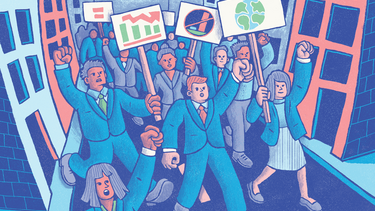Leading through COVID: A Climate for Change
In this series, we talk with Yale SOM alumni about their professional and personal lives during the global pandemic. Judy Samuelson ’82, executive director of the Aspen Institute’s Business and Society Program, explores whether this cataclysm will trigger lasting change.
Adapted from a phone interview, May 13, 2020.
Q: How has the pandemic impacted you personally?
I live in New York. It’s home, and I don’t have a second home. The pandemic slammed the city. One of my daughters lives in Harlem in the middle of three hospitals; for six weeks the sirens were constant. Every night at 7 o’clock we open our windows and there’s a rousing two minutes of cheering and cow bells to recognize the medical workers. They’ve gotten us past the worst of the devastation.
Q: How has it changed your work?
I run the Aspen Institute’s Business and Society Program. Like a center within a university, we raise own money and pay overhead to the mother ship for various kinds of support and branding. We do very high-touch work supporting dialogue and networks of leaders in large corporations who are leaning into the complicated issues of business and society. Our business model is very dependent on fee-for-service revenue; this was a real shock to the system.
There are 11 of us on the team, all remote now. After weeks of working continuously, we’ve figured out how to maintain some of our programing, virtually. I wouldn’t want to have to run it like this all the time, but, especially for people who already know each other and have had some deep experiences in the heavily designed programs with dialogue that we typically run, they’re able to pick up and continue online, which is great.
Q: Do you see the pandemic creating an opening for a new normal in business?
I’m of two minds about what this will mean for business. I wrote a piece a couple of weeks into the shutdown making the case that there’s no going back. I talked about an awakening around the issues that are buried deep in the supply chain and an opening for fresh thinking about resilience and a circular economy.
Clearly there’s abiding interest in environmental sustainability and yearning to use this moment to address inequalities. In that sense, this is a great opportunity for leaders. We could see a change in boards to include greater diversity of voices and governance. All of these things are possible.
“CEOs were glad to sign the Business Roundtable’s statement moving away from shareholder primacy to value a range of stakeholders—because they believe they already prioritize a range of stakeholders.”
On the other hand, before this pandemic we were poised to finally see the business community own the need for policy solutions on climate. Companies like Shell and Microsoft are still moving forward, but I’ve been saddened by how complicated it is for business leaders to continue to speak out on climate change during this cataclysmic blow. This is, or should be, a moment where we do some things differently for the health of society and long-term health of the economy, but the climate piece has to be reframed for this moment, and I don’t know how much time we have.
The Business and Society Program also does a lot of work on CEO pay. Again, this is another domain where we’ve been stuck for a long time, yet it could be a real opportunity for change. To address inequality, you have to design compensation systems that work across the spectrum from low to high. We’re poised to have a different conversation about that because it’s been so clear the essential frontline workers are so often facing financial insecurity.
Q: What will push it one way or the other?
Leadership, leadership, leadership. Will we see leaders say, “I’m going to do this differently—and bring along my peers”?
CEOs were glad to sign the Business Roundtable’s statement re-examining the purpose of corporations, moving away from shareholder primacy to value a range of stakeholders. But we’re learning part of why they didn’t have any hesitance is because they believe they already do prioritize a range of stakeholders. If they are already doing everything they plan to do, then the statement is of limited use. If business leaders make a big statement and don’t make any change, it’s going to breed a lot of cynicism about the role and purpose of the corporation.
Over 90% of profits are being returned to shareholders, where 30 or 40 years ago it was close to 50%. That can’t continue. There’s not enough money to fix the range of things we need to fix and to keep giving 90% of profits to shareholders.
Q: Are you questioning the role of business in systemic change?
I believe we need business at the table to address the most complex problems. Both because current business models created the results we have now and because of the remarkable capacity and talent that business represents, in the U.S. and globally. We need that capacity to do the heavy lifting on changing climate policy and on addressing inequality and discrimination.
This is a sobering time because it’s hard to do anything more than just cope with this moment, even as other critically important priorities must be addressed. One of the reasons I really like working with business is that business tends to be a “Let’s get this done” environment with a lot of optimism and desire to bring people together across different perspectives to get results by working at the center.
Judy Samuelson’s new book The Six New Rules of Business: Creating Real Value in a Changing World will be published by Berrett-Koehler in January 2021
